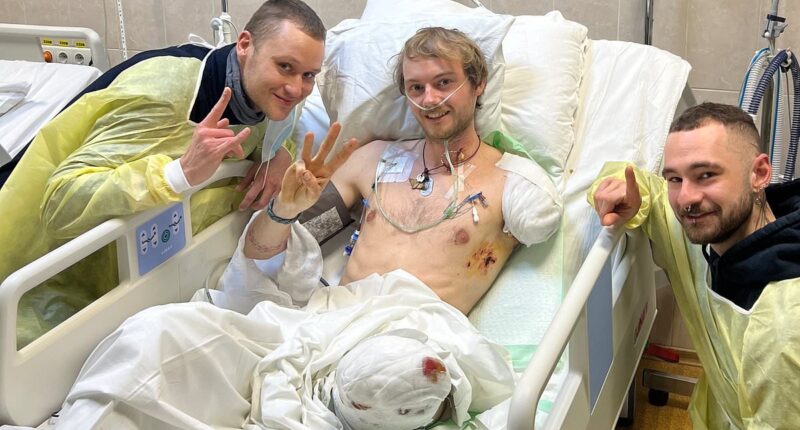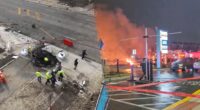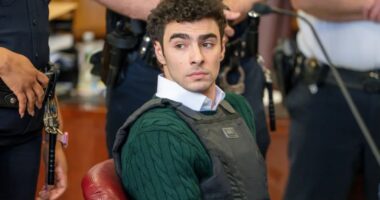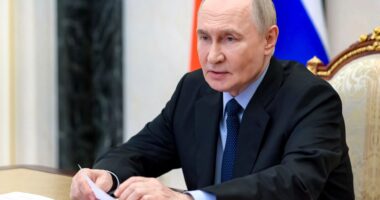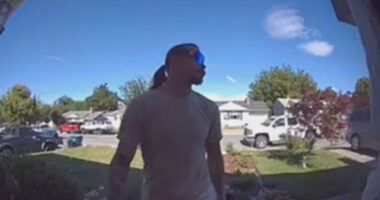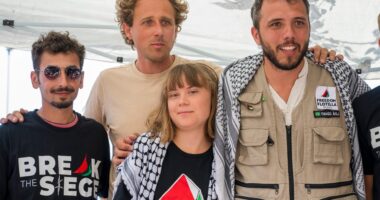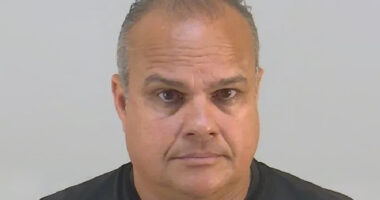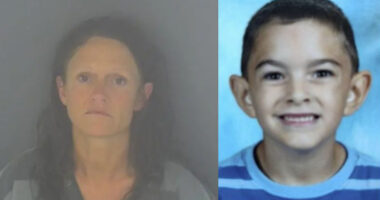A British aid worker is lucky to be alive after losing an arm and a leg following a Russian drone strike in Eastern Ukraine.
In Dorset, Ed Scott, a resident of Shatesbury, was carrying out the evacuation of civilians near the frontline when a Kamikaze drone targeted the van he was driving, which was clearly marked as a civilian vehicle, at a distance of only 5km from the combat zone.
During the attack, the 28-year-old bore the brunt of the impact and was immediately taken to the hospital in a critical state. Despite the efforts of a colleague to sustain him, medical professionals had no choice but to perform amputations on his left leg and arm.
His coworkers at BASE UA, where he volunteers and is affectionately known as ‘Eddy’, have reported that he is currently in a stable condition in the Intensive Care Unit. Despite the challenging circumstances, Ed Scott is reportedly maintaining a positive attitude and is considered fortunate to have survived the harrowing ordeal.
They told MailOnline: ‘He is stable and conscious.
‘Eddy is a shining example of what being a good person is and I know we are not alone when we say he is our hero.
‘Eddy has dedicated the last three years of his life to helping others, risking his life countless times.’
Pictures from Mr Scott’s hospital bed show him giving a peace sign to the camera while swathed in bloodied bandages and wired up to breathing apparatus.

Ed Scott, from Shatesbury, in Dorset, was left needing his arm and leg amputated after a Kamikaze drone attacked the civilian-marked van he was driving

Colleagues at BASE UA where Mr Scott, known as ‘Eddy’, has been volunteering, say he is in a stable condition in ICU

Scott, a former superyacht worker who was educated at Sherborne school, arrived in Ukraine in 2022 and began volunteering with BASE UA
He has his left arm amputated just 10cm below the shoulder, while his left leg has been removed above the knee.
Mr Scott, a former superyacht worker who was educated at Sherborne school, arrived in Ukraine in 2022 and began volunteering with BASE UA, an NGO who help evacuate civilians from besieged areas and provide them with shelter.
On Thursday morning he left the town of Kramatorsk in the Donbas region to help refuel generators powering mobile network towers in the town of Pokrovsk.
After assisting residents the team – wearing white to signify they were aid volunteers – left before returning to evacuate a couple whose home had been shelled.
At around 12.50pm local time while travelling back with the evacuees, the team’s armoured Fiat Ducato – marked as a civilian evacuation transport – was struck by an Russian-operated First Person View drone.
The device – which is controlled by an operator via a headset – was carrying a cumulative charge and struck the top rear left side of the van just above where Mr Scott was driving.
Team leader Pylyp Rozdestvennkyi suffered minor shrapnel wounds but was able to scramble out of the van and rush to Mr Scott’s side where he applied tourniquets.
The male evacuee was unharmed, while his wife sustained a non-critical shrapnel wound to her left thigh.

Following surgery, he was transferred to an ICU at Mechnikov Hospital in Dnipro where he is recovering

He has his left arm amputated just 10cm below the shoulder, while his left leg has been removed above the knee

BASE UA are an NGO who help evacuate civilians from besieged areas and provide them with shelter

On Thursday morning he left the town of Kramatorsk in the Donbas region to help refuel generators powering mobile network towers in the town of Pokrovsk

Doctors battled to save Mr Scott’s limbs but his injuries were so severe they were forced to amputate

It is believed Mr Scott will be flown home to the UK once he is well enough to travel
Mr Rozdestvennkyi was able to flag down a passing military vehicle which to Mr Scott to Hryshyne before being taken by ambulance 40 mins to Dobropillya Hospital in Dobropillya where they arrived at around 14.40pm – nearly two hours after the strike.
Doctors battled to save Mr Scott’s limbs but his injuries were so severe they were forced to amputate.
Following surgery, he was transferred to an ICU at Mechnikov Hospital in Dnipro where he is recovering.
According to a friend of Mr Scott, the volunteer had travelled to Ukraine after struggling to get into the army in 2022.
After getting advice on how he could assist with the war from other volunteers he bought a truck and set up a fundraiser.
Mr Scott set up a charity called Dorset to Donetsk where he took supplies out to Ukraine in the truck.
He later linked up with various people and was the subject of a series of paintings created by acclaimed British adventure artist Max Denison-Pender.
It is the second time in two months the charity has been targeted by Russian drones.
On December 2, while evacuating three civilians from the Shevchenko village near Pokrovsk, the team was attacked by two russian FPV drones which destroyed another Fiat Ducato van. No-one was injured.
A GoFundMe set up to raise money for Mr Scott’s recovery and rehabilitation had raised almost £33,000 by Sunday afternoon.
It is believed Mr Scott will be flown home to the UK once he is well enough to travel.
The Foreign Office said: ‘We are supporting a British man who has been injured in Ukraine and are in touch with the local authorities.’
